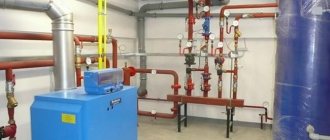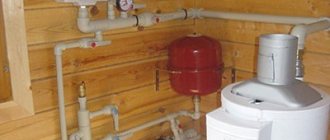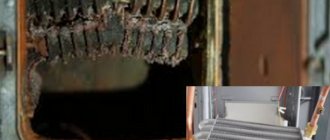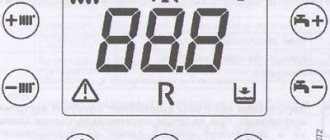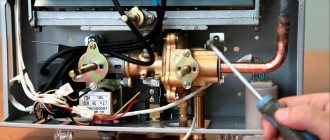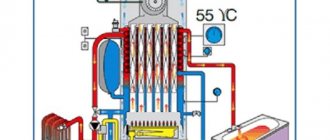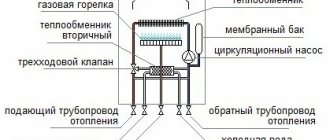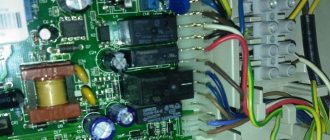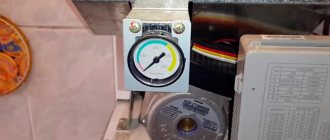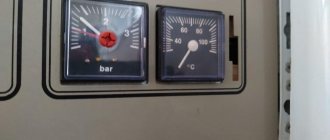When noises occur
The new boiler operates almost silently, no louder than a household kettle. But sometimes, over time, if the components are incorrectly installed, configured or worn out, the device beeps quietly or even makes noise like an airplane.
Loud noises in the heating boiler disturb users; the reasons may be the following:
- The water in the system is highly oxygenated. When heated, air bubbles are released which produce noise. This happens most often in open heating systems. At the same time, not only the device itself vibrates, but also the wall radiators.
- The boiler puffs if a lot of air has accumulated in the coolant system.
- Scale in the heat exchanger. If the water is hard, over time lime will build up on the walls of the radiator pipes.
This also reduces equipment durability and efficiency. A sign of scale accumulation is that the device hisses like a kettle when it warms up.
- Strong noise can be produced by an incorrectly operating fan designed to remove combustion products. This can be caused by drying out of the lubricant inside its bearings, imbalance, or accumulation of dust and dirt on and around the blades.
- Perhaps it is not configured correctly, and that is why the gas valve or bypass is howling.
Bypass installation example - When operating at high power, a faulty gas meter rattles.
- If the equipment power exceeds the required, vibration occurs from excess pressure created by the pump. The device also cracks if there is too little coolant in the system.
- Often a loose valve or a valve inside it rattles.
Reasons why gas equipment makes extraneous noise
If a gas boiler is humming, this indicates a malfunction in its normal operation. The reasons may be various, from installation errors to scale formation. The sooner the problem is identified, the faster it will be fixed. Operating problematic equipment can be dangerous. Problems can occur in any part of the unit. Therefore, it is necessary to analyze not only the nature of the sound, but also its source. This will allow you to quickly and accurately identify a possible malfunction.
Exhaust fan malfunction
Some models are equipped with fans. As a rule, these are units with a closed chamber.
While rotating, fans may begin to make noise due to:
- lack of fan lubrication. High temperatures cause the lubricant to dry out quickly. This negatively affects the condition of the bearings, which simply fail;
- dirt deposits. Dust impairs the performance of equipment. Therefore, it is necessary to periodically clean the fan.
The appearance of scale in the heat exchanger sections
The water contains a lot of salts, which cause scale to form on the surface of the equipment.
There will be a hissing sound when heated. The heating itself proceeds more slowly than usual. Therefore, the radiator needs annual cleaning. Indeed, in this part the water moves slower than in the water supply pipes, which leads to increased sedimentation of salts.
Strong water pressure is often sufficient for flushing. In difficult cases, chemical reagents are used. This is an extreme case, because chemicals can provoke the formation of cracks in the radiator that were previously clogged with scale.
Low gas pressure
The pressure in the device may decrease for the following reasons:
- There is a water leak in the appliance.
- The boiler was installed or configured incorrectly.
- Defects in the expansion tank of the device.
- The characteristics of the boiler do not correspond to the load that is placed on it.
Low pressure causes loud sounds when equipment operates. If a malfunction is detected, it is recommended to inspect the device for leaks. Particular attention is paid to the joint area. It is convenient to carry out inspection using a napkin. If any holes are found, they must be closed.
It is worth noting that when the pressure decreases, the equipment automatically stops working. Gas pressure is affected by water pressure. When one indicator decreases, the second decreases to its minimum level immediately. The boiler switches off automatically.
It is recommended to find out the optimal indicators in order to periodically check the condition of the gas apparatus.
Lack of water in the system
It was noted that water and gas levels influence each other. If one indicator decreases, the second automatically also decreases. The reason for the deterioration in water pressure levels may lie in air jams. Because of this, the amount of incoming water decreases. The air creates obstacles to the normal circulation of liquid.
A lack of liquid is dangerous because it causes overheating of the boiler. Therefore, clicks are heard when it operates. Such airing provokes a decrease in the thermal output of the device, reduces or blocks the circulation of the coolant.
The following factors can lead to such consequences:
- depressurization that occurred during repairs on risers;
- there was a violation of the integrity of the system;
- Carrying out preventive maintenance to replace devices and their elements.
If a gas boiler whistles in a private house, then this is the first sign of air pockets in the system.
To resolve the problem, it is recommended to adjust the thermostat. You should also make sure that it is installed correctly. You can add water yourself or adjust its supply in the heating system. Many boilers are equipped with a special lever in case of low water pressure.
Airing in the system
When the heating boiler clicks, the problem may be the formation of a large amount of air in the system. This problem is especially relevant if there has been a long break in the operation of the device.
When a gas boiler knocks during operation, it is necessary to bleed off excess air. Modern models are equipped with special taps. They are unscrewed and the air is released. First, be sure to install a bucket into which the water will drain. It is important to act carefully. After the air is released, the valve is screwed back on. After this, the knocking noise during operation should stop.
Boiler settings are incorrect
The boiler is making a loud noise due to incorrect equipment settings. The equipment literally howls when such a malfunction occurs. Errors in settings can cause incorrect load distribution, which will only damage the equipment.
If the gas appliance operates at high power, it may rattle. This signals that the device has exceeded its standard performance. If vibration is felt, it means the circulation pump is noisy and the problem is excess pressure.
When the boiler, when heating, makes sounds similar to metal hitting metal, this indicates that the hanging brackets located on the radiator are installed incorrectly. As a result, uncompensated expansion of the bodies occurs.
If the gas boiler is humming, it is recommended to check whether its settings are correct. Pre-study the equipment configuration. This will allow you to find out what indicators should be set for normal operation of the device. If necessary, the pump power is reduced, the location of the ignition electrodes is adjusted, and they are cleaned.
It is due to problems with ignition that the boiler makes a loud bang when hot water is turned on.
Reasons for the formation of sounds and pops
Sharp sounds and pops have the following causes:
Semi-automatic boiler wick
Popping and clicking noises when igniting
When starting an Ariston or another brand of boiler, do you hear knocking and popping noises? The problem requires an immediate solution.
Three-way valve
The part is used to switch the operation of the unit from heating hot water supply (DHW) to heating, and vice versa. A faulty valve will click every time it is ignited. In this case, it needs replacement.
Ignition block
A loud bang occurs when the spark ignites for a long time. Then a lot of gas accumulates, which flares up when ignited. It is necessary to carry out diagnostics of the unit: burner, igniter, electrode, contacts and connections.
Wick clogged
When ignited, the product bangs, which indicates a clogged wick or chimney. The problem is typical for semi-automatic models. Inspect the wick: if clogged, clean it.
To make sure that the chimney shaft is clogged, check for draft:
- Place a lit match near an inspection window or vent.
- If the flame deviates to the side, the draft is normal; if it burns evenly, it needs cleaning.
For your part, you can clean out the mine. But to completely remove contaminants, it is better to contact utility services.
In models with automatic ignition, the electrode may become clogged. Clean the part and install it 3-4 mm from the burner.
The injectors are clogged
When heating, a noise is heard, ignition does not occur, or the flame bursts out in jerks. Turn off the gas supply and clean the holes with a thin wire.
Incorrect installation
If the calculation and mounting of the device body is incorrect, the sounds of metal impacts appear. When the cladding heats up, the metal expands, and when it cools, it returns to its previous position, which leads to extraneous sounds.
The same thing happens with pipes that are walled into walls. When you turn on the heating and start hot water, the pipes expand slightly, which leads to knocking. When installing pipes into walls, it is necessary to leave a gap for thermal expansion.
Heat exchanger plates clogged
Then the boiler explodes when heated. And the plates can become clogged with dust, soot and soot. Remove the housing and clean the parts with a wire brush or a special vacuum cleaner.
The mesh located at the bottom of the case could become clogged with dust. In technology with an open combustion chamber, this leads to a decrease in thrust. Don't forget to clean.
Incorrect operation of the circulation pump
As a result of uneven operation, resonance occurs in the system, which leads to extraneous noise. Adjust pump settings.
Before starting any work, close the gas valve.
To reduce vibration, place a gasket under the housing. Regularly maintain the unit and clean parts from scale and dirt. This will allow you to operate the boiler safely and for a long time.
Loud noise when a gas boiler is operating may be a sign of a faulty heating system. Extraneous noise occurs as a result of some kind of malfunction, which definitely requires attention from a qualified specialist. Such a malfunction should not be ignored for a long time, as it can aggravate the problem and lead to an emergency stop. Loud noise from the boiler is a problem that can easily develop into the purchase of a new one. This is incredibly expensive and should be avoided.
If you notice that the gas boiler has become very noisy, the only and correct solution for you will be to invite our service engineer to study this problem in detail. An employee from our company is a highly qualified specialist who is needed in every home in the event of a problem in the operation of the central heating system, to carry out diagnostics to identify the malfunction.
Strong noise from the boiler is the reason for immediate contact with us and a reason to resort to the services of our engineers. There are many reasons that cause boiler noise during operation. Some problems are minor and can be eliminated during one visit of our technician, while some require financial expenses, especially where several breakdowns have occurred.
How to avoid noise
It is important to turn off the gas before making any repairs. If you suddenly feel that you smell of gas, immediately turn off the tap at the entrance to the house, turn off electrical appliances, ventilate and call the gas service.
During installation, you can install an elastic vibration-absorbing layer under the casing in all places where the boiler comes into contact with the wall.
Boiler cleaning
First of all, it is important to carry out regular maintenance of heating equipment, which includes cleaning components, removing dust and lubricating some elements. This will increase the lifespan of your boiler and eliminate noise before it even occurs.
In a closed system, you need to add water from time to time, monitoring the pressure gauge. In some devices, for example, Visman Vitopend, it is displayed on the control panel at the bottom of the case.
Let's figure out what to do when the device is already making strange sounds:
- If the cause is oxygen saturation of the water, the problem can be solved by converting the open system to a closed one. To do this, air vents are installed on the water heating boiler and the expansion tank is replaced with a membrane one.
- The fan should be inspected and cleaned. It is important to note that the main blades are located inside the housing under the casing. After cleaning the dust and dirt, additionally lubricate its bearings. If this does not help, the cooler needs to be replaced.
- When the heat exchanger howls, you need to clean the scale inside it. In order to remove it, the casing is removed and the pipes connected to it are unscrewed. It is best to pour a special anti-scale chemical inside, which is sold in hardware stores, and leave it for several hours. If removing the heat exchanger is too difficult, the product is poured inside using a flexible hose.
- If the gas valve whistles, you need to check its settings. The correct configuration is written in the operating instructions.
Automatic gas valve - When the pump power exceeds the need of the system, it is necessary to reduce its speed by changing the position of the white switch under the cover on the terminal block.
- Air from the heating system is discharged through a brass air vent on the front panel of the device.
- If there is a popping noise when igniting in semi-automatic models with piezo ignition, such as Bosch W, clean the nozzle and pilot tube, which is ignited by the starter, from dust and clogging.
- When an automatic boiler, for example Ariston Genius, turns on with a loud bang, you should clean the ignition electrodes and, if necessary, adjust their location. After this, the fire will proceed quietly.
- Noise from valves can be prevented by replacing them with ball valves or installing an additional rubber gasket.
- To get rid of the fact that the gas meter is clicking, you need to call the gas service to check it. Most likely, you will have to replace the device.
- In order to eliminate metallic knocking when the temperature of the radiators changes, you should move the wall mounts to places that coincide with their support points. Putting rubber gaskets on the brackets also solves the problem.
- When heating pipes built into the wall ring, you need to lay a special insulating material called Merelon around them. It is advisable to think about this at the time of installation, so as not to spoil the repair later.
If it is difficult to localize the sound, let the boiler operate in different modes. For example, if you have a double-circuit device, for example Ferroli Atlas, and you don’t understand what and why it’s humming, turn off the hot water supply. Next, note at what time interval the extraneous sound appears, when the boiler is just starting up or at high temperatures, after it overheats.
Why does a gas boiler make noise: when turning on and heating water
Hello, dear readers. Why is a gas boiler noisy? This question is very relevant for owners of this equipment.
Noises in a gas boiler may reflect difficulties in the heating network. It is necessary to quickly identify the causes and eliminate problems, otherwise the equipment may completely fail.
Noises when heating water
When a gas boiler makes noise when heating water, the indirect reasons for this are as follows:
- Installation and connection errors.
- Incorrect setting.
- Wear of nodes.
If a gas boiler is very noisy, there are more clear reasons for this:
- The water in the pipes has a high concentration of oxygen. Therefore, when heated, bubbles form. Due to this effect, noise and vibrations of both the boiler and batteries increase.
- Air has accumulated in the system. When there is knocking and puffing in the device, you need to remove air from the pipes. Current radiators have taps. To eliminate air, you can simply unscrew them.
- If there are a lot of salts in the water, they are deposited in the heat exchanger, or rather on its walls. And when heated, the equipment hisses. At the same time, thermal output and heating dynamics also suffer. The first thing that makes noise is the heat exchanger in a gas boiler. It is necessary to clean the radiator at least once a year. For this task, a pump with a special reagent is used. Cleaning fluid flows into the device through the hoses.
- The fan began to work poorly. It is usually designed in modifications with an isolated combustion compartment and forced elimination of combustion products. It can spin very noisily and even whistle. Causes:
A) The bearings are located above the burner. And the grease dried out in them. These parts need to be disassembled and lubricated.
B). Blades are unbalanced. Contaminants have accumulated on them. They need to be cleaned and their rotation adjusted.
- There is too much pressure in the heating pump. In this situation, the gas boiler pump makes quite a noise. It needs to be configured again. Excessive pressure in the network can cause an emergency. To configure, you just need to switch the white lever on the terminal box.
The device may overheat due to a lack of water in the network. You need to study the thermostat parameters and set lower parameters. Pressure is also measured. If necessary, add coolant.
If your wall-mounted gas boiler makes a whine-like noise, the gas valve or bypass (jumper) may be set incorrectly.
When operating at significant power, rumbles also come from the gas meter.
Often a gas boiler makes a rattling noise due to a worn valve.
There is a popping sound when igniting
When a gas boiler makes noise when turned on, with knocks, clicks and pops, you need to immediately solve this dilemma. Causes of noise:
- Problems with the three-way valve. With its help, the boiler switches from DHW to heating function and vice versa. If it clicks constantly, it needs to be replaced.
- The cause of the pop is the prolonged ignition of the spark. A lot of gas is formed. And when ignited it bursts into flames. It is necessary to check the burner, igniter, electrode and all contacts.
- The filter or chimney is clogged. They need cleaning.
Checking the chimney shaft is carried out as follows:
A lit match is brought to the ventilation. If the fire is deflected, the draft is normal. If it burns directly, cleaning is required.
You can clean the shah yourself. But their total cleaning is the prerogative of public utilities.
If a gas heating boiler with automatic ignition is noisy, then the reason lies in a clogged electrode. This element is cleaned and placed 3-4 mm from the burner itself.
- The injectors are clogged. It is necessary to turn off the gas for a while and clean them using a thin wire.
- Installation errors. If the body of the device is hung incorrectly, then when the facing side is heated, the metal is deformed. When cooled, it returns to its original form. This effect is observed in pipes embedded in walls. Then, when you turn on the hot water, the gas boiler hums. When installing pipes into walls, it is necessary to maintain a small space for such deformations - expansions.
- The plates in the heat exchanger are heavily clogged. Types of blockage: dust, soot, soot. It is necessary to remove the housing and thoroughly clean these elements. A special vacuum cleaner is used.
Points 5 and 6 are the most common answers to the dilemma, why does the gas boiler make noise when you turn on the hot water?
It is worth checking the mesh under the body as well. If necessary, clean it.
- The heating pump is not functioning correctly. Resonance appears in the system. If this occurs only when the heating pump is turned on, then its settings need to be corrected.
Before any work, be sure to close the gas valve. If you smell gas, call a special service.
Check if the gas boiler is noisy. To reduce vibration, it is worth laying a gasket under its body.
Causes of noise
There are actually not so many reasons for knocking in heating pipes when heating. Some noise can be ignored - it does not harm the system or heating devices. But noises such as buzzing, crackling, knocking, gurgling, and howling should give reason to think and take urgent action.
- air pockets in the system;
- clogging or overgrowing of pipes due to poor-quality coolant;
- leaks in the pipeline;
- violation of installation work when installing taps, valves and laying pipes;
- failure or wear of working equipment;
- cavitation, an increase in pressure in places where the diameter of pipes increases (decreases);
- incorrect calculation or non-compliance with design recommendations when installing the heating system.
These circumstances arise in private closed-loop systems and make us think about their urgent elimination.
The circulation pump in the heating circuit system promotes forced movement of water, which leads to uniform heating and displacement of accumulated air from the system.
If the heating in a house or apartment is connected to a central pipeline, then startup, accompanied by similar sounds, is normal. Water, filling the general system, pushes out air, and, flowing along the contour, is accompanied by gurgling, knocking and crackling sounds.
As soon as the equipment enters operating mode, the general adjustment of the system will end - the temperature of the batteries will increase, and everything will stop. This is clearly visible in the diagram of heat supply to consumers from the central boiler house.
Why there is noise in batteries and how to eliminate it
If a knocking sound is heard in the heating boiler during heating, after which it is repeated in other areas of the circulation ring, including heating radiators, the following should be done:
- On the supply and return lines, in places where removable threaded fittings are installed, filter meshes should be installed that will trap scale, limescale that has peeled off from the walls of the boiler, and other solid impurities. When suspensions and lime deposits circulate along the circuit, solid particles can hit the metal, which causes knocking. Filter pads should also be inspected and cleaned before each heating season.
- If you tap bimetallic or cast iron heating devices with a hard object, you can hear an echo in certain areas. This indicates the presence of an air lock in the system, due to which the gas boiler knocks when heating water. Excess atmospheric air accumulated in the system can be easily removed using Mayevsky taps or through automatic air vents mounted at all upper points of the system and at the bends of the circulation circuit.
- When the consumer cannot find the reason why the gas boiler is knocking, and this sound spreads to the heating radiators, attention should be paid to the circuit diagram of the network. If it is converted from open to closed, with the installation of a membrane tank, the water will no longer be saturated with oxygen. This will help avoid unpleasant sound effects when boiler equipment is operating.
When there is a crackling noise in a gas boiler, the cause may be hidden in one of the 3 cases described above. After minor modifications, this problem will disappear, which will allow you to operate the equipment in normal mode.
Types of noise in pipes
The noises that accompany the general heating start-up differ from emergency ones - they are intermittent and are accompanied by gurgling or gurgling. In bimetallic or aluminum batteries, a crackling or buzzing noise may be heard - this is also normal.
It is clear that prolonged noise is unpleasant, so it is necessary to prevent the situation in a timely manner.
The knocking and hum that occurs in the room with increasing force give reason to be wary and take drastic measures:
- Check heating devices and temperature conditions in the circuit. If a pump is installed, then its operation.
- Pay attention to the valves - if they break, a characteristic whistle appears. Sometimes a small adjustment is all it takes to get the equipment working.
- Having discovered visible problems, you need to stop the coolant and turn off the heating devices. Having assessed the breakdown, proceed to eliminate the accident yourself or invite a specialist.
These are primary measures that can prevent the development of major destruction.
Sounds from heating devices
If you hear a howl in the middle of the night, then most likely the system has leaked. A cloud of steam and a characteristic whistle will immediately indicate a gust or a failed valve. In some cases, it is enough to close the tap to bring the heating system into working condition.
If no obvious causes are found, and the howling is accompanied by a crackling sound, it is necessary to check the pressure. Perhaps the flying scale blocked the free flow of the coolant, which caused increased pressure - it is urgent to stop the boiler, drain the water and look for the problem.
It happens that the batteries start to “shoot” - this is another reason to be wary. Such noise is typical for bimetallic batteries when the pressure in the system does not coincide with the calculated one.
When purchasing heating appliances, you need to take into account the operating parameters of the boiler and select the appropriate radiator. Otherwise, the problem may result in a rupture of the heating device due to water hammer, which is completely inappropriate in the winter cold.
Heated water is not able to compress; it needs to move freely along the contour. Banal deposits in pipes can provoke an increase in pressure and rupture of pipes due to water hammer.
Another reason is an air lock, which can be eliminated through the Mayevsky drain valves located at the ends of the batteries. The procedure is simple, and anyone can handle it.
Other Possible Causes
A gas boiler may hum for technical reasons related to wear of loaded parts of heating equipment. For example, rolling bearings hum if maintenance has not been performed correctly. In this case, the gas boiler begins to hum already at startup, even before the burner is turned on and the combustion front of the gas fuel appears.
In this situation, the culprit for the hum is usually the pump. In order to verify this, you need to remove the front panel and place your hand on the body while the pumping apparatus is operating. If the reason is in the bearings, then you will feel strong vibration.
Can a gas burner make noise?
This is the most difficult case to diagnose correctly. Only an experienced specialist can recognize the sound of a malfunctioning burner. The pitch of the sound changes depending on the set heating power; it is masked by extraneous noise and interference.
The removed front panel will help to distinguish the noise of the gas burner more clearly - the hum from the operating burner will become more audible. A normally operating device makes almost no noise. If a hum or whistle is heard, this means that gas combustion occurs in an off-design mode.
The input or output of pipes on a gas boiler is humming
Often it is not the gas boiler itself that hums, but the supply pipe at the inlet to the pressure regulator. This means that inside this section or tap at the inlet there is interference, due to which liquid vibrations form in the pipe. This is what old water valves sound like when they open.
You can try to fix the problem by replacing the tap with a model with a larger flow area.
Have you encountered a similar problem?
There was noise in the gas boiler, I fixed it myself.
83.33%
When the gas boiler was humming, I called the gas workers, and they fixed everything.
0%
I have fairly new equipment, so far it works flawlessly.
0%
I don't have a gas boiler.
16.67%
Voted: 6
Pump noise
A common cause of problems is pump operation. Typically, it has three positions to raise the water column to a certain height, which depends on the power of the device. The uniform movement of the coolant along the thermal circuit is not accompanied by noise effects.
If you hear strange sounds that sound more like mechanical sounds, you should check the operation of the pump.
In case of failure:
- water gurgles in the heating pipes of a private house;
- a hum appears;
- cracking is possible;
- The boiler begins to make noise and knock.
In this case, you need to turn off the pump, and if the sounds stop, then the cause has been found. Cracking and noise are mechanical damage: this means that the graphite sliding bearings have worn out or dirt has gotten into the housing.
Scale settles on the inner walls of the pump due to poor-quality coolant and has a destructive effect on its components.
Checking is simple:
- it is enough to remove the pump;
- lower its working part into a container of water;
- when turned on, it must pump water; if this does not happen, it must be repaired.
Important! The pump cannot be turned on without water.
The column in the gas boiler clicks
Clicking noises occur in automatic and semi-automatic boilers. Possible causes of problems:
- The gas heater does not light up. The contacts on the ignition unit may have come out of alignment. A complete replacement of the part will be required, since it is not possible to disassemble it. In addition, the reason may lie in dead batteries.
- If the gas water heater clicks after turning off the water, the water regulator may be damaged. Inside the block there is a rod with legs, which is connected to the ignition block.
- When the water is turned off, a metal spring returns the rod to its original position. The rod may jam due to a rusty rod. The ignition unit produces a spark when switched on. This is what causes the speaker to crack. The malfunction can be caused by a worn out frog membrane, then a new one must be installed.
Poor traction also causes noise in the column. The cause may be metal-plastic windows or scale in the heat exchanger. The reason will be determined by an experienced technician when inspecting the column.
Extraneous sounds in the heating boiler
Sometimes the heating of the boiler is also accompanied by some sounds. When cold equipment heats up and begins to crack, the characteristic clicks should not cause panic - metal makes such sounds when it warms up.
Gurgling and gurgling are also possible - this is also a normal phenomenon: the coolant began to heat up and set the system in motion. However, the same sounds can occur if there is insufficient coolant in the pipes. In this situation, it is enough to add water to ensure uniform heating.
Cotton
You can hear such sounds if the gas outlet pipes are clogged. This happens when the boiler is ignited: the accumulated gas, without having time to escape, creates a bang. This is dangerous, as a sudden burst of flame can cause burns or fire.
If the boiler is gas, then the reasons for such noise are clogged nozzles or a malfunction of the three-way valve. In this situation, it is necessary to clean the equipment from soot.
The occurrence of a knocking sound in the boiler indicates its incorrect installation or unregulated operation of the pumping equipment. If the pump operates unevenly, moving the coolant in jerks, resonance occurs between the boiler and the pump, accompanied by a characteristic knocking sound. In this case, it is necessary to regulate the operation of the pump.
Sounds in different boiler models
Noise can occur for a trivial reason, which lies in the boiler model itself. This is typical for gas boilers equipped with ventilation burners. To avoid such trouble, you need to choose boilers with atmospheric burners and an electronic control system.
When choosing a solid fuel or electric boiler model for heating your home, you should always familiarize yourself with the technical characteristics of the equipment. Often the cause of noise can be incorrectly selected equipment, as well as the presence of a fan in the boiler.
Double-circuit boilers also suffer from noisy operation: although not obvious, water overflows and filling of the system are always accompanied by sounds.
When the boiler is turned on, a popping sound is heard
If, when you turn on the gas boiler, you hear extraneous noises: pops, clicks, knocks, you should immediately start looking for the problem.
The three-way valve is the main component of a double-circuit gas boiler. Its task is to regulate the redistribution of flows when the hot water supply is turned on. If the cause of extraneous noise lies in the valve, it is faulty and the part needs to be replaced
What to do if the gas boiler slams sharply when turned on:
- Three-way valve malfunction. This device sends water in a small circle when drawing sanitary water from taps. If it clicks, it needs to be replaced.
- Prolonged spark ignition. When ignited, the resulting excess gas flares up and a characteristic pop is heard. In this case, it is recommended to check the igniter, burner, electrode, and all contacts.
- The chimney or filter is clogged. In this case, they need to be cleaned. The chimney is checked with a lit match. If the flame deviates, everything is fine; if there is no draft, cleaning is required.
- Installation error. If the equipment is installed incorrectly, but when heated, the metal is deformed and popping sounds are heard. The same sound occurs when it cools as the metal returns to its original position. When switching to hot water supply, the boiler hums. The problem is solved by reinstalling the gas boiler.
- The injectors are clogged. A thin wire is used to clean them. You must first turn off the gas.
If the boiler vibrates during operation, it is recommended to place a gasket under the body.
How to remove an air lock with your own hands
Air in the system after a long stop is common. This problem arises not only in the private sector, but also in apartment buildings. It's quite easy to solve.
Heating radiators are equipped with Mayevsky taps located at the ends of the radiators. This could be a valve or a fitting with a notch for a screwdriver.
- armed with a small container (for draining water), you need to unscrew the tap and let out the air;
- Actions should be performed carefully so as not to get burned by the escaping steam;
- when water comes out of the hole, close the valve;
- Such manipulations are carried out on each battery.
This eliminates noise and allows the coolant to move freely through the system, evenly releasing heat.
Prevention measures
If the boiler hums when starting up or turning on hot water, you must first make sure that there is a sufficient level of liquid in the system and, if necessary, top it up. If sounds are coming from radiators and pipelines, it means that air pockets have formed in them, which should be removed. If the pump knocks or whistles, it is most likely a manufacturing defect: you will have to install a new working unit.
An effective preventive measure is timely removal of scale from the heat exchanger. It is also important to monitor the gas supply so that the pressure does not build up too high.
Methods for cleaning radiators from dirt
During operation of the heating system, dirt accumulates in it: iron oxides, dissolved salts and possible mechanical impurities. But if water moves through the pipes at high speed, then in the radiators the process slows down and the sedimentation of suspended matter increases. Therefore, cleaning radiators is a must.
There are two methods: flushing the entire system together and disconnecting the batteries and cleaning using a compressor unit. Favorable conditions are created in the batteries for the accumulation of dirt, since the coolant slows down the movement in them. To flush, the radiator is connected to the compressor, and dirt is cleaned from it with water pressure.
If you carry out annual preventive maintenance of the entire system, then drastic measures will not be required. It is quite possible to limit yourself to a general flushing of the entire heating circuit with ordinary water. Chemical reagents are used in cases where the coolant does not meet the established parameters and significant deposits of salts and scale appear on the working elements.
After using chemicals, leaks may form in radiators and cracks may appear that were successfully covered with dirt.
To avoid an emergency, all equipment must be checked for functionality before starting the system.
Timely preventive maintenance of all components of the heating system will protect it from complex accidents and save the budget.
Video
By watching the video, you can find out why the circulation pump is noisy and what needs to be done.
Evgeniy Afanasyev chief editor
Author of publication 08.11.2018
Did you like the article? Save so you don't lose!
Knocking in the heating pipes of a private home is a common occurrence for owners with individual heating. Why the noise occurs and what influences it is necessary to understand.
The main indicator of trouble is poor-quality coolant containing dissolved salts and mechanical impurities.
Causes of noise
There are actually not so many reasons for knocking in heating pipes when heating. Some noise can be ignored - it does not harm the system or heating devices. But noises such as buzzing, crackling, knocking, gurgling, and howling should give reason to think and take urgent action.
- air pockets in the system;
- clogging or overgrowing of pipes due to poor-quality coolant;
- leaks in the pipeline;
- violation of installation work when installing taps, valves and laying pipes;
- failure or wear of working equipment;
- cavitation, an increase in pressure in places where the diameter of pipes increases (decreases);
- incorrect calculation or non-compliance with design recommendations when installing the heating system.
These circumstances arise in private closed-loop systems and make us think about their urgent elimination.
The circulation pump in the heating circuit system promotes forced movement of water, which leads to uniform heating and displacement of accumulated air from the system.
If the heating in a house or apartment is connected to a central pipeline, then startup, accompanied by similar sounds, is normal. Water, filling the general system, pushes out air, and, flowing along the contour, is accompanied by gurgling, knocking and crackling sounds.
As soon as the equipment enters operating mode, the general adjustment of the system will end - the temperature of the batteries will increase, and everything will stop. This is clearly visible in the diagram of heat supply to consumers from the central boiler house.
Why is a gas boiler humming - reasons and solutions
Users, as a rule, prefer silent gas boilers. If the unit is in good working order, it should not produce too loud noises. But it happens that the boiler makes an uncharacteristic hum. Then the question arises, why is the gas boiler humming? If it is new, then in most cases there are no problems here, just some new elements expand and contract under the influence of temperature changes. It takes time for them to get into working shape and fall into place.
The most common reasons why a gas boiler hums loudly are:
- fan malfunction;
- a large amount of oxygen in the coolant;
- sediment on parts;
- reduction in gas pressure.
Sometimes the reason why a double-circuit gas boiler hums is a malfunction of the fan. This is caused by a lack of lubrication and contamination of the blades. In this case, it is necessary to clean the fan and lubricate the bearing with oil. If necessary, the broken part is replaced with a new one.
The hum of a gas boiler can be monotonous or periodic with crackling. Smooth noise occurs even with new units. In this case, boilers in which the coolant circulates naturally are usually noisy. The cause is an excessive amount of air in the coolant. The fact is that when heated, many air bubbles form in the water, which produce noise. This is the answer to a common question from consumers, why a gas boiler hums when heating. Such noise does not mean there is a problem with the gas unit, but it does cause some discomfort.
The problem can be solved by converting the system to a closed one. You can change the type of system by installing valves and replacing the expansion tank with a membrane one. It will also be useful to connect weather-sensitive automation. Such measures will help extend the life of the unit.
Another common reason why a gas boiler hums loudly is the accumulation of limescale deposits. When the coolant is heated to more than 60ºC, scale begins to actively develop, which over time clogs the heat exchanger pipes. In this case, the heat exchange between the circuit and the coolant deteriorates, and the efficiency of the unit is significantly reduced. Under the influence of circulating water, pieces of scale break off and move, while they hit the metal walls of the heat exchanger and create a knocking noise.
The problem is solved by cleaning the heat exchanger. However, flushing can only be done on regular circuits. If the bithermal heat exchanger becomes clogged, all you have to do is throw it away and buy a new one. In addition, such circuits become clogged faster than their classic separate counterparts.
After installing a cleaned heat exchanger in a gas boiler, it will stop making noise.
In some cases, noise in a gas boiler causes a decrease in gas pressure. Because of this, water circulation in the system decreases and air pockets appear. As a result, the unit overheats, trying to reach the required temperature, and begins to hum.
You can eliminate noise by solving the problem of low gas pressure. The reason for the decrease may be:
- low pressure in the line;
- gas pipeline contamination;
- presence of a leak (accompanied by a characteristic smell of gas);
- gas meter malfunction.
If the “root of the problem” is a leak or low pressure in the centralized main, then only representatives of the gas service can help.
If a gas pipeline is clogged, it needs to be cleaned. If a breakdown occurs in the gas meter, fuel will pass through it with difficulty. A symptom of a problem with the meter is noise and crackling noise coming from it. After replacing the measuring device with a new one, the pressure will return to normal and the noise will stop.
Note! It is necessary to know the optimal gas pressure readings and measure it periodically. The value should be within 1.5-2 atmospheres.
There are other reasons why a gas boiler hums or makes noise:
- The bypass or gas valve is not set correctly, resulting in a howling sound.
- If the power of a gas appliance exceeds what is required, this often results in vibration and rattling sounds.
- If there is a lack of coolant in the system, the gas boiler will also make vibration noise.
- If sounds of rattling metal appear, this may be due to installation errors of the unit.
Types of noise in pipes
The noises that accompany the general heating start-up differ from emergency ones - they are intermittent and are accompanied by gurgling or gurgling. In bimetallic or aluminum batteries, a crackling or buzzing noise may be heard - this is also normal.
It is clear that prolonged noise is unpleasant, so it is necessary to prevent the situation in a timely manner.
The knocking and hum that occurs in the room with increasing force give reason to be wary and take drastic measures:
- Check heating devices and temperature conditions in the circuit. If a pump is installed, then its operation.
- Pay attention to the valves - if they break, a characteristic whistle appears. Sometimes a small adjustment is all it takes to get the equipment working.
- Having discovered visible problems, you need to stop the coolant and turn off the heating devices. Having assessed the breakdown, proceed to eliminate the accident yourself or invite a specialist.
These are primary measures that can prevent the development of major destruction.
Sounds from heating devices
If you hear a howl in the middle of the night, then most likely the system has leaked. A cloud of steam and a characteristic whistle will immediately indicate a gust or a failed valve. In some cases, it is enough to close the tap to bring the heating system into working condition.
If no obvious causes are found, and the howling is accompanied by a crackling sound, it is necessary to check the pressure. Perhaps the flying scale blocked the free flow of the coolant, which caused increased pressure - it is urgent to stop the boiler, drain the water and look for the problem.
It happens that the batteries start to “shoot” - this is another reason to be wary. Such noise is typical for bimetallic batteries when the pressure in the system does not coincide with the calculated one.
When purchasing heating appliances, you need to take into account the operating parameters of the boiler and select the appropriate radiator. Otherwise, the problem may result in a rupture of the heating device due to water hammer, which is completely inappropriate in the winter cold.
Fan problems
The fan operates in models with a closed chamber and forced removal of combustion products. Why does it make strange sounds when rotating, whistling:
Fan malfunctions can often occur. Then, when rotating, it can cause various extraneous sounds. The cause may be insufficient lubrication. The lubricant tends to dry out quickly due to exposure to high temperatures. As a result, the bearings fail.
The accumulation of dirt and dust in the blades is another cause of squeaking. The fan needs to be removed and cleaned.
The accumulation of dirt and dust in the blades is another cause of squeaking. It is necessary to clean them to get rid of squeaking when rotating. The fan is used for the smoke exhaust function and also removes residual gas combustion products.
Pump noise
A common cause of problems is pump operation. Typically, it has three positions to raise the water column to a certain height, which depends on the power of the device. The uniform movement of the coolant along the thermal circuit is not accompanied by noise effects.
If you hear strange sounds that sound more like mechanical sounds, you should check the operation of the pump.
In case of failure:
- water gurgles in the heating pipes of a private house;
- a hum appears;
- cracking is possible;
- The boiler begins to make noise and knock.
In this case, you need to turn off the pump, and if the sounds stop, then the cause has been found. Cracking and noise are mechanical damage: this means that the graphite sliding bearings have worn out or dirt has gotten into the housing.
Scale settles on the inner walls of the pump due to poor-quality coolant and has a destructive effect on its components.
Checking is simple:
- it is enough to remove the pump;
- lower its working part into a container of water;
- when turned on, it must pump water; if this does not happen, it must be repaired.
Important! The pump cannot be turned on without water.
Why does a gas heating boiler crack - scale in the heat exchanger
Over time, deposits form inside the heating unit, which disrupt the operation of the system. This is especially audible when the coolant is heating up - the boiler may click, crackle, chirp, etc. It all depends on the design of the heat exchanger.
It is best not to wait for extraneous sounds to appear, but to wash the unit once a year in the summer. To do this, it must be dismantled and filled with a special compound. If you carry out the work regularly, this problem can be completely eliminated.
Prevention should not be neglected - it is worth installing one or more filters at the water inlet for cleaning.
Extraneous sounds in the heating boiler
Sometimes the heating of the boiler is also accompanied by some sounds. When cold equipment heats up and begins to crack, the characteristic clicks should not cause panic - metal makes such sounds when it warms up.
Gurgling and gurgling are also possible - this is also a normal phenomenon: the coolant began to heat up and set the system in motion. However, the same sounds can occur if there is insufficient coolant in the pipes. In this situation, it is enough to add water to ensure uniform heating.
Cotton
You can hear such sounds if the gas outlet pipes are clogged. This happens when the boiler is ignited: the accumulated gas, without having time to escape, creates a bang. This is dangerous, as a sudden burst of flame can cause burns or fire.
If the boiler is gas, then the reasons for such noise are clogged nozzles or a malfunction of the three-way valve. In this situation, it is necessary to clean the equipment from soot.
The occurrence of a knocking sound in the boiler indicates its incorrect installation or unregulated operation of the pumping equipment. If the pump operates unevenly, moving the coolant in jerks, resonance occurs between the boiler and the pump, accompanied by a characteristic knocking sound. In this case, it is necessary to regulate the operation of the pump.
Sounds in different boiler models
Noise can occur for a trivial reason, which lies in the boiler model itself. This is typical for gas boilers equipped with ventilation burners. To avoid such trouble, you need to choose boilers with atmospheric burners and an electronic control system.
When choosing a solid fuel or electric boiler model for heating your home, you should always familiarize yourself with the technical characteristics of the equipment. Often the cause of noise can be incorrectly selected equipment, as well as the presence of a fan in the boiler.
Double-circuit boilers also suffer from noisy operation: although not obvious, water overflows and filling of the system are always accompanied by sounds.
ZOTA boilers are very sensitive to the quality of the coolant, so unpleasant effects can be caused by:
- clogged mud trap;
- oxygenated water;
- scale on working elements;
- Broken bearings on the fan.
Therefore, it is worth choosing single-circuit models and purchasing a boiler to heat hot water.
Prices for ZOTA boilers
Prevention
Timely prevention of all components of boiler equipment can minimize the likelihood of noise.
Thus, flushing the system once a year is a prerequisite for trouble-free operation. Moreover, this is becoming a mandatory requirement of many resource supply organizations in preparation for the heating season.
You can flush the system yourself or use the services of specialists.
Depending on the coolant, the type of cleaning is selected:
- Washing with water under pressure generated by the compressor. Sometimes this is enough.
- For iron oxide deposits on pipes, appropriate chemicals are used. They eliminate the problem and additionally create a protective barrier from further exposure to an aggressive environment.
- You can use the services of a specialized organization that has the equipment and tools to perform the work.
Each operating manual for heating equipment provides a recommendation for preventive inspection and cleaning of the working parts of the boiler from corrosion and all kinds of contaminants with partial disassembly - at least once a year. If maintenance is not carried out, the manufacturer withdraws its warranty obligations.
Why does the boiler hum when hot water is turned on?
Gas boiler repair specialists note that the occurrence of noise when heating water can be influenced by indirect or more serious reasons.
First, you need to study not the most serious breakdowns that will not be difficult to fix on your own.
Why is the gas boiler humming?
- Serious errors were made during installation or assembly of equipment. To fix the problem, you need to check all parts and connections. If you have no experience in plumbing, then it is advisable to call a specialist who did the installation. He will correct his shortcomings.
- A gas boiler, like any other equipment, must be correctly configured to operate under specific conditions. If the owner of the equipment made mistakes, then loud noises may appear when heating the water. The only way to fix the problem is to carefully read the instructions and re-make the necessary settings.
- The boiler may begin to hum due to old age. If the equipment was purchased many years ago, then some components are probably out of order. In this case, only replacement with new equipment will help.
These problems are rather vague. If the boiler starts to hum, then first you can check these three points, perhaps one of them will help fix the problem. Such operations can be carried out in a fairly short period of time. But if a gas heating boiler makes a lot of noise when heating water, then it is necessary to look for clearer and more serious reasons.
Boiler noise when heating water:
- One of the main reasons why a boiler hums when heating a liquid is the high concentration of oxygen in the water that passes through the pipes of the device. Because of this, when heated, a large number of bubbles can form in it. This effect produces not only a strong hum, but also noticeable vibrations. A clear sign of increased oxygen concentration is the hum of the gas boiler and the vibration of the batteries connected to it.
- A large amount of air has accumulated in the installed system. If you hear strong puffing and even knocking noises when heating the water, then it is necessary to remove the air from the pipes. Modern boilers are equipped with special taps; they must be opened to release air and eliminate the problem.
- Another common problem that causes a loud humming sound when heating water is the accumulation of salts that are deposited in the heat exchanger. To fix the problem, you will need to open the gas boiler. If its walls are covered with salts, then you were able to find the cause of the buzzing. Due to the accumulation of salts, the equipment begins to work very loudly when heating the water. Thorough cleaning and rinsing of the heat exchanger walls is necessary. It is important to note that thermal output and heating dynamics may also be affected. Initially, the hum will come from the heat exchanger, which is located in the gas boiler.
To avoid difficulties, it is necessary to check and, if necessary, clean the radiator at least once a year. For these purposes, it is advisable to purchase a pump from a specialized store (otherwise the heat exchanger will not have enough water for cleaning), which has a reagent. The cleaning liquid will be supplied to the gas equipment through hoses.
The fan is quite easy to dismantle.
The fan is usually connected to a special compartment through which combustion products are eliminated. If the fan becomes clogged, the boiler starts to operate very noisily. You can even hear a whistle.
There are several reasons for fan failure:
- First you need to check the condition of the bearings. They should be located directly above the burner. It is possible that the lubricant that should be poured inside has evaporated or leaked. In this case, it is necessary to disassemble the device and lubricate the parts. It is important to read the instructions before doing this and find out which lubricant is suitable for the equipment model you are using.
- If the problem is not resolved by replacing the lubricant, you will have to check the balancing of the blades. Since a large amount of combustion products exits through the pipes, a large amount of dirt can stick to the blades. As a result, when rotating, they will begin to work very loudly and create an unpleasant hum. To restore the fan's performance, it is necessary to thoroughly clean the blades, and then correctly adjust their rotation through balancing.
If none of the above methods helps fix the problem, you need to check the pump in the boiler, which can make a lot of noise when the pressure in the system changes. In this situation, you will have to configure it again. If too much pressure builds up in the pump, the first sign of this is the appearance of a humming sound.
It is not difficult to replace a broken pump
In the future, this can lead to an emergency situation that is dangerous to human life. To change the equipment settings, you need to move the white lever on the box where the terminals are located to a different position. As a rule, the problem disappears.
The correct setting is necessary for the boiler to operate without extraneous noise when heating water. If the device overheats greatly, this can lead to the problem in question.
The main reason is the lack of water in the network. In this case, you will need to study the operation of the thermostat and its parameters. Perhaps its settings have gone wrong. You will have to set more appropriate parameters yourself. It is also advisable to measure the pressure inside the system. If there is a need for this, add a coolant inside the device.
You can also regulate the gas valve or bypass on a gas boiler, which is also called a jumper. If a humming noise starts when the water heats up, then these parts need to be adjusted.
If clicking or popping noises are observed during startup, you need to check the following parts:
- Three-way valve. This is a switch from hot water to heating. If clicks are observed during operation, the valve must be replaced.
- The spark takes a long time to fire. If the burner is unstable, a spark may not appear immediately. This will cause a gas build-up to form. As soon as ignition occurs, it will flare up and you can hear popping sounds. To fix the problem, you will need to check the burner and igniter, as well as all contacts.
- The chimney or filter is clogged with dirt. The solution is thorough cleaning. The chimney is checked with a lit match. It must be brought close to the ventilation; if the flame sways, then the system is working properly.
By checking these parts, replacing them or cleaning them, the boiler will stop making clicking noises every time it ignites.
A gas boiler is a necessary thing in a private home. Therefore, when purchasing, it is necessary to carefully study the instructions for it in order to find out about the existing parts of the device that may have to be repaired.
If you properly care for and timely adjust the equipment and clean certain parts, then you can reduce the likelihood of extraneous noise appearing in the boiler when heating water. The device will operate normally.
Sometimes insufficiently purified water enters the heating network - the filters simply cannot cope with the cleaning. Because of this, when heated, a sediment appears, and with it scale, the volume of which only increases over time. The device begins to work worse and make characteristic whistling sounds.
In this case, attention should be paid to the heat exchanger. Directing heat to the coolant, it begins to whistle. This indicates that there is already quite a lot of scale. If it is not eliminated, then characteristic tapping sounds may be added to the whistle.
In such a situation, it is necessary to thoroughly clean the heating system. To do this, you need to contact a specialist. Normal cleaning is only possible using a special pump and special chemicals that remove scale and other deposits. As a rule, the boiler stops making noise after this procedure. If the noise remains, then the reason is different.
Important! We recommend cleaning the heating system at least once a year.
Another reason why a gas boiler whistles lies in the coolant itself. Or rather, oxygen can get into it. The coolant heats up, oxygen is released in small bubbles. Because of this, a sound appears that resembles a boiling kettle. At times it can be quite loud, causing discomfort to residents.
To avoid such noise, the heating system must be well insulated. There are several ways to do this:
- install a membrane tank;
- install air vents;
- equip the automation with sensors that react to weather changes;
- introduce automatic make-up into the heating structure.
Each of these methods not only helps eliminate noise, but generally increases the efficiency of heating equipment. But it is not recommended to do such work yourself. It is better to entrust it to a qualified technician.
The task of the fan is to remove combustion products from the apparatus, to blow through the system and remove smoke. A whistling sound during operation may indicate a malfunction. In new boilers, such a breakdown is very rare. But if you have been using the boiler for several years, it is quite possible.
The problem often occurs if the fan is located above the burner or there is no lubrication. Gradually it dries out, which causes rapid wear of the bearings. This can be solved by simply disassembling the fan and lubricating the parts.
Sometimes a whistle can indicate that the blades are unbalanced. There are many reasons for this phenomenon, but the main one is the accumulation of dust and dirt. The solution is cleaning. In some cases, it is easier to replace the fan with a new one. This is a relatively inexpensive part of the system, but to replace it, it is also better to contact a specialist.
Sometimes whistling and hissing are caused by low pressure or lack of coolant in the system. The latter factor leads to overheating of the boiler and noise. In addition, the following may occur:
- the boiler was initially installed and connected incorrectly;
- the equipment was configured incorrectly;
- the components are already worn out after long-term use;
- excessive pressure from the pump;
- lack of water in the system;
- incorrect valve setting;
- valve is damaged.
In some cases, noise may occur not only during operation of the equipment, but also when turned on.
How to remove an air lock with your own hands
Air in the system after a long stop is common. This problem arises not only in the private sector, but also in apartment buildings. It's quite easy to solve.
Heating radiators are equipped with Mayevsky taps located at the ends of the radiators. This could be a valve or a fitting with a notch for a screwdriver.
- armed with a small container (for draining water), you need to unscrew the tap and let out the air;
- Actions should be performed carefully so as not to get burned by the escaping steam;
- when water comes out of the hole, close the valve;
- Such manipulations are carried out on each battery.
This eliminates noise and allows the coolant to move freely through the system, evenly releasing heat.
Methods for cleaning radiators from dirt
During operation of the heating system, dirt accumulates in it: iron oxides, dissolved salts and possible mechanical impurities. But if water moves through the pipes at high speed, then in the radiators the process slows down and the sedimentation of suspended matter increases. Therefore, cleaning radiators is a must.
There are two methods: flushing the entire system together and disconnecting the batteries and cleaning using a compressor unit. Favorable conditions are created in the batteries for the accumulation of dirt, since the coolant slows down the movement in them. To flush, the radiator is connected to the compressor, and dirt is cleaned from it with water pressure.
If you carry out annual preventive maintenance of the entire system, then drastic measures will not be required. It is quite possible to limit yourself to a general flushing of the entire heating circuit with ordinary water. Chemical reagents are used in cases where the coolant does not meet the established parameters and significant deposits of salts and scale appear on the working elements.
After using chemicals, leaks may form in radiators and cracks may appear that were successfully covered with dirt.
To avoid an emergency, all equipment must be checked for functionality before starting the system.
Timely preventive maintenance of all components of the heating system will protect it from complex accidents and save the budget.

